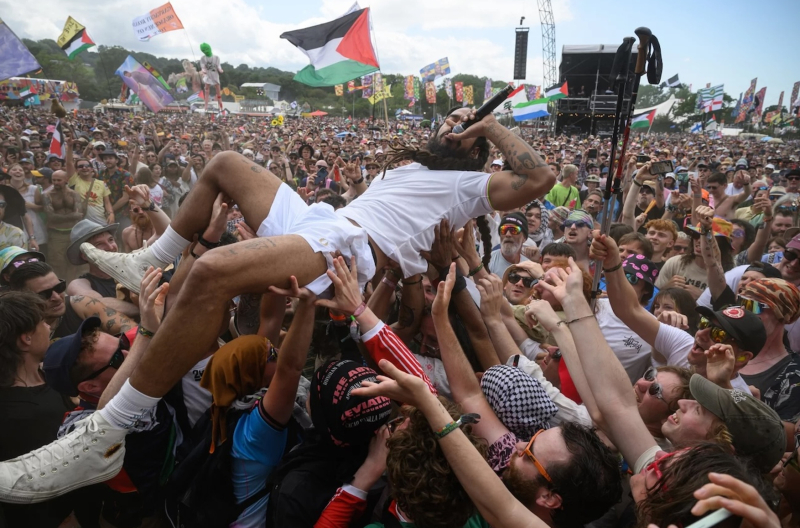Bobby Vylan of the punk rap group Bob Vylan crowdsurfing during the Glastonbury music festival. Photo: Leon Neal / Getty Images
Punks cross the line
In 2022 and 2023, Glastonbury was a sea of Ukrainian flags. But with the onset of the new war in Gaza, that changed. Blue and yellow were replaced by Palestinian symbols — a shift that reflected the mood among Britain’s youth. Ukraine has faded from focus, and now Gaza has become the cause célèbre. Many young Britons view Israel’s actions as constituting genocide against Palestinians.
But what happened on Saturday, June 28, was, in the words of the Glastonbury festival’s organizers themselves, well beyond acceptable boundaries. The culprits were the British punk rap duo Bob Vylan. Mid-performance, frontman Pascal Robinson-Foster shouted anti-Israel slogans, including the controversial phrase “From the river to the sea, Palestine will be free,” capped with the Arabic “inshallah” (“God willing”). The chant is widely interpreted as a call for the elimination of the State of Israel. The crescendo came when the audience-echoed another chant: “Death, death to the IDF!”
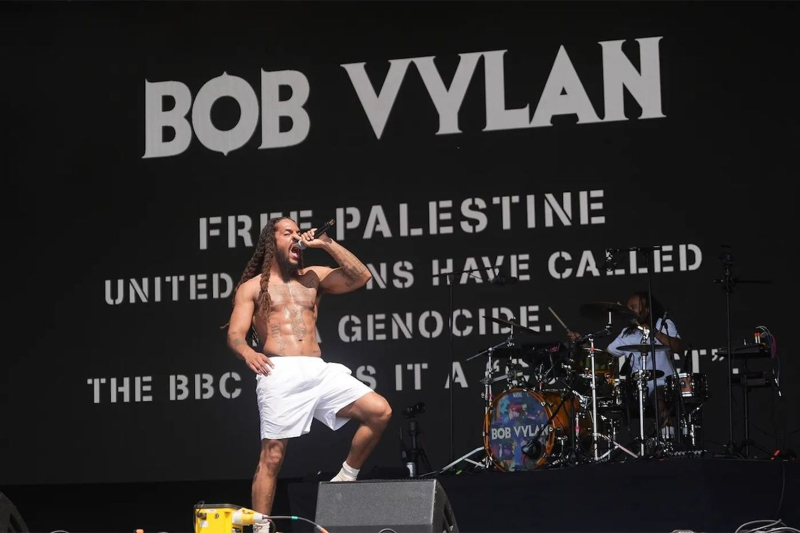
The incident was compounded by the fact that the performance was being aired live on the BBC’s iPlayer service. Last year, the network’s Glastonbury coverage earned it a BAFTA, and it might have garnered similar praise this year were it not for the chanting debacle. Bob Vylan wasn't even one of the festival’s headline acts, and yet their political outburst went viral almost immediately, with both supporters and critics sharing footage of the chant across YouTube and other platforms.
The chant “Death to the IDF!” was broadcast live by the BBC.
The BBC issued an apology for failing to cut the live feed during the performance, but many deemed the explanation inadequate. Prime Minister Keir Starmer condemned the incident, and Secretary of State for Culture Lisa Nandy demanded an explanation from BBC Director-General Tim Davie. In a June 30 speech before Parliament, Nandy argued the broadcaster suffers from a “leadership problem.” Commentators believe the fallout may cost Davie his job.
Shadow Home Secretary Chris Philp went further, calling for legal action against the BBC, saying that it “should not be transmitting hateful material designed to incite violence and conflict.”
Ofcom, the UK’s communications regulator, also announced an investigation, saying there are “questions” for the BBC to answer.
So what now? The punks, known for their flair for provocation, shocked the country and may have broken the law. The police have launched a formal investigation. The BBC made a serious error, and, by all appearances, it will be punished.
Is that the end of the story? Far from it. The Glastonbury episode has ignited a firestorm of debate that is unlikely to burn itself out anytime soon. The right accuses the left of harboring hatred for Israel and Jews, while the left charges the right with ignoring the tragedies in Gaza and labeling any sympathy for Palestinians as antisemitism.
Business Secretary Jonathan Reynolds tried to strike a middle ground:
“Let’s not shy away from the issue, which is people in a crowd glorifying violence. I don’t think it’s something we’d associate with any music festival, but it’s a wider societal problem. I can’t believe some of the scenes that we saw. It’s possible to be completely concerned by the scenes in Gaza and not stray into the kind of behaviour and endorsement that we saw with that performance. I’m shocked that people would even not realise what they’re participating in when they do that.”
Irish battle rap
Meanwhile, police are also probing another Glastonbury performance: that of Irish rap group Kneecap. My Northern Irish friends speak of them with horror and disgust. Even the band’s name, Kneecap, is a nod to a brutal form of punishment once used by the Provisional IRA against enemies and alleged criminals: shooting or smashing the kneecaps to permanently disable victims.
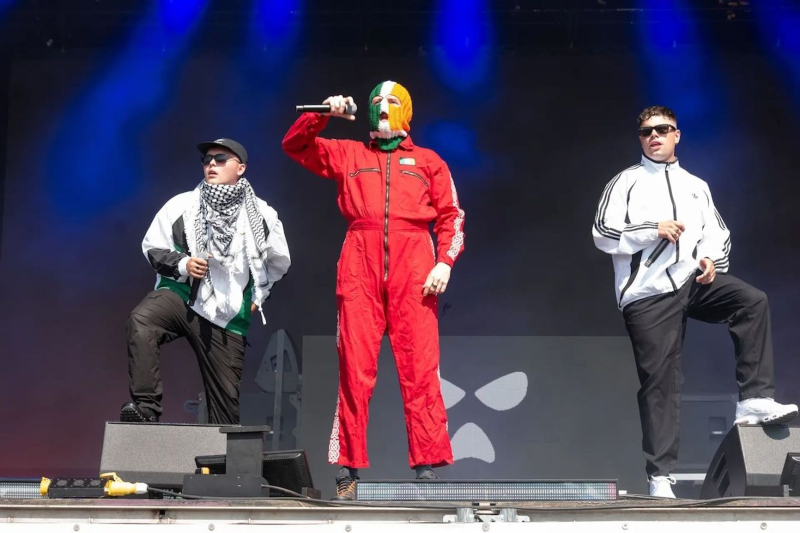
Kneecap’s music makes their choice of name no accident — they are staunch advocates of Irish unification and opponents of British rule in Northern Ireland. They also openly endorse violence. At one show, a rapper shouted, “Kill your MP!” In recent years, UK lawmakers like Jo Cox and David Amess have indeed been assassinated for their political positions. The group apologized to the victims’ families, claiming they meant no harm, but the apologies were rejected as being insincere.
Interestingly, the rappers previously claimed they are being targeted by a “coordinated smear campaign” — not because of their views on Northern Ireland, but over their statements on Gaza. According to them, the campaign began after they spoke out against the “ongoing genocide of the Palestinian people.” They went on: “Establishment figures, desperate to silence us, have combed through hundreds of hours of footage and interviews, extracting a handful of words from months or years ago to manufacture moral hysteria.”
Kneecap previously claimed they are being targeted by a “coordinated smear campaign” over their statements on Gaza.
The group is backed by former Irish MEP Clare Daly, known for her fierce criticism of Israel and support for Palestinian causes. She also takes a strongly pro-Russian stance: Daly has consistently voted against any European Parliament resolution condemning Russia, calling them “Russophobic.” She expressed bewilderment at her colleagues’ outrage over the jailing of Alexei Navalny, labeling him a “vicious anti-immigrant racist.”
Daly’s support for pro-Iranian militias in Iraq, which have been accused by groups like Human Rights Watch of committing war crimes and carrying out anti-LGBT+ massacres, has also sparked outrage in Ireland. Daly defends the militias, calling the accusations against them baseless and claiming they respect international law. Kneecap have voiced no objection to Daly’s positions.
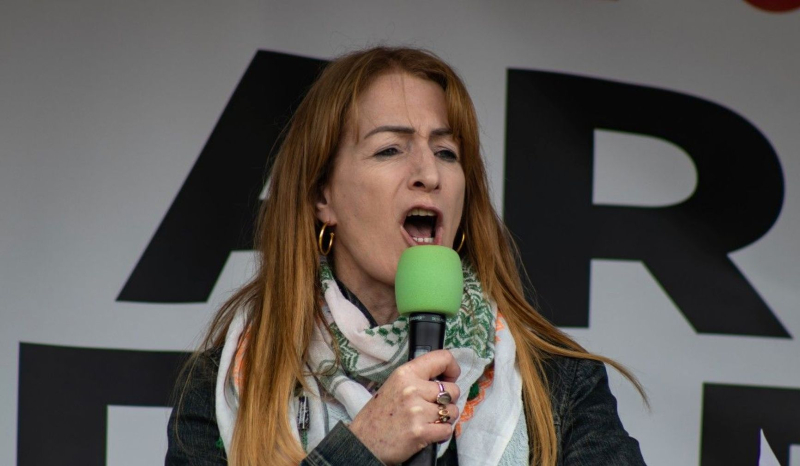
Prime Minister Starmer and other officials warned Glastonbury against hosting Kneecap, especially as one member of the group is under investigation for his alleged support of terrorist groups (he shouted “Up HAMAS! Up Hezbollah!” during a performance). Nevertheless, the festival organizers pushed back against what they saw as “political interference” and allowed the group to perform. The BBC chose not to air Kneecap’s set — and indeed, the group also shouted anti-Israel slogans from the stage.
Free speech, but for whom?
The episode raises multiple questions, none of which has an easy answer. Where does free expression begin and end for the tens of thousands who gathered at Glastonbury that Saturday — and for the millions watching worldwide? Many Britons, especially younger ones, seem unwilling to follow the government’s line, and street polls feature a common refrain: perhaps the musicians went too far, but concerts shouldn’t be censored.
Journalist Karishma Patel resigned from the BBC over the scandal — accusing it of cowardice and a refusal to acknowledge what she called the “truth” of Israeli war crimes in Gaza, to which there was “more than enough evidence.” She later said the Glastonbury episode — and the BBC’s attempts to appease the side expressing outrage over the chants — validated her decision to quit.
Even British Jews are divided. As Chief Rabbi Ephraim Mirvis tweeted: “This is a time of national shame. The airing of vile Jew-hatred at Glastonbury and the BBC’s belated and mishandled response, brings confidence in our national broadcaster’s ability to treat antisemitism seriously to a new low.” But in response, the account of the Torah Jews group posted: “While we will never condone violent chants, you wouldn't seriously entertain the flimsy idea that the IDF is some sort of representation of Jews? That would be entirely unbecoming for a Rabbi of any stature.”
Of course, it is legitimate to criticize the actions of the Israeli government and its military. But inciting others to violence and murder is not criticism, not opinion — it is a crime. Then again, defending Israelis who chant “Death to Arabs” or “The only good Arab is a dead Arab” is no better. Or is it?
But the issue is indeed complicated — which is why the response has been so adversarial. For example, is the popular social media user BKG (British Kashmiri Girl) right to suggest that if a white rapper had called for the death of Black people, or if someone had shouted “Death to Muslims,” the BBC surely would not have broadcast it?
I’m inclined to agree that, in such an instance, the national broadcaster likely would have exercised greater caution. Years of promoting political correctness have had their effect, and, if kept in balance, maintaining the habit of not offending minorities is not a bad thing. But accusations of double standards can cut both ways.
I see it online: the same people who recently raged against Britain’s supposed crackdown on free speech and called for the release of Lucy Connolly — who was convicted for her calls to burn Muslims alive — are now demanding that musicians be jailed and the BBC punished. In other words, when commenters agree with an opinion — be it anti-Muslim or anti-Israel in nature — they tend to argue in favor of free speech; but if the controversial statement in question is offensive to them, there is a tendency to call for such speech to be criminalized.
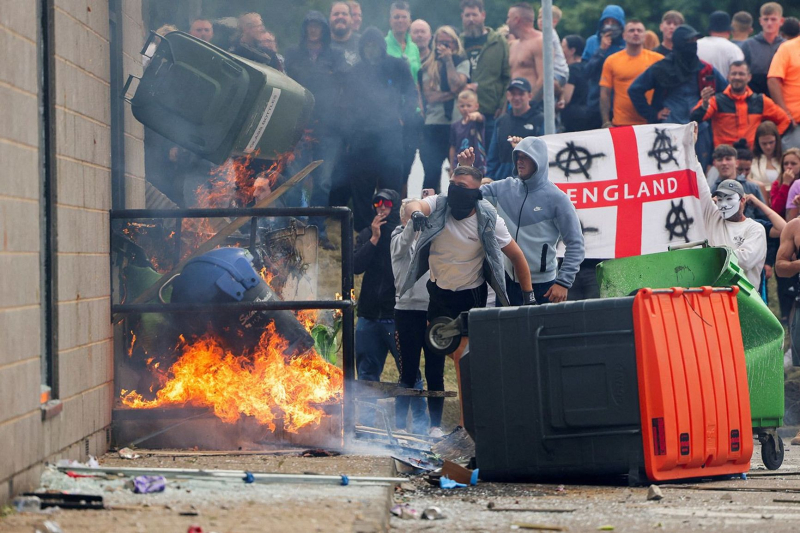
Not long ago, U.S. Vice President J.D. Vance publicly shamed the British for their supposed lack of free speech, citing as an example the harsh sentence handed down to none other than Lucy Connolly. And yet, within hours of Bob Vylan’s controversial performance, the Trump administration revoked the band’s visas, forcing them to cancel an already announced tour. Maybe it’s time to call out all such practitioners of double standards.
“There’s a difference if you’re a Jew”
Katie Razzall, the BBC’s culture and media editor, was at the performance and saw it all firsthand. Here’s what she wrote: “As I stood in the crowd and caught the lead singer's comments about using violence to get your message across, and leading the crowd in chants of ’death, death to the IDF,’ it was clear, as the festival's organisers said afterwards, that a line had been crossed. This was not the peace-loving, welcome-to-all vibe that Glastonbury tries to project.”
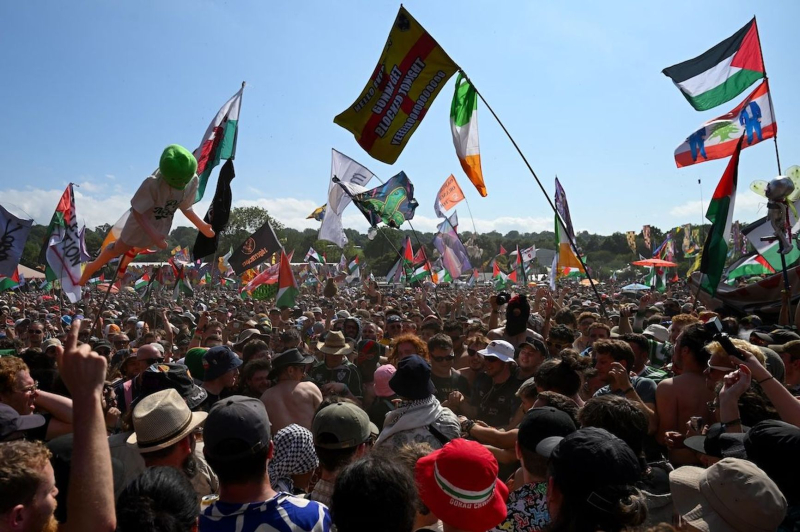
Razzall spoke to numerous audience members, the majority of whom supported both Bob Vylan and Kneecap and who expressed the view that the government should listen to their “message” and “stop supporting genocide.” This reflects the current public sentiment in the country. Polls show that more Britons sympathize with Palestinians (29%) than with Israelis (16%), while 23% express equal sympathy for both, and 31% say they are unsure.
Razzall also spoke with Jewish festival-goers. “They told me they had to hide their identities at Glastonbury this year because they feared the response they might get,” she wrote. “One told me in a place that is so optimistic and accepting of everyone, ‘there's a difference if you're a Jew.’ Both perspectives should be heard.”
Appalling opinions
Many well-known rock musicians, revered by generations, have also criticized Israel, with some seeing its actions as undue cruelty, others as outright genocide. The most infamous (and, some would say, the most unhinged) among them is Pink Floyd frontman Roger Waters.
The Anti-Defamation League has accused him of blatant antisemitism, and it has presented compelling evidence to back up the claim. Waters speaks frequently of a “Jewish lobby” that allegedly prevents musicians from “telling the truth.” He draws comparisons between Israel and Nazi Germany, rails against what he calls the “worship” of Holocaust remembrance, denies Israel’s right to exist, and fully justifies Hamas’s actions.
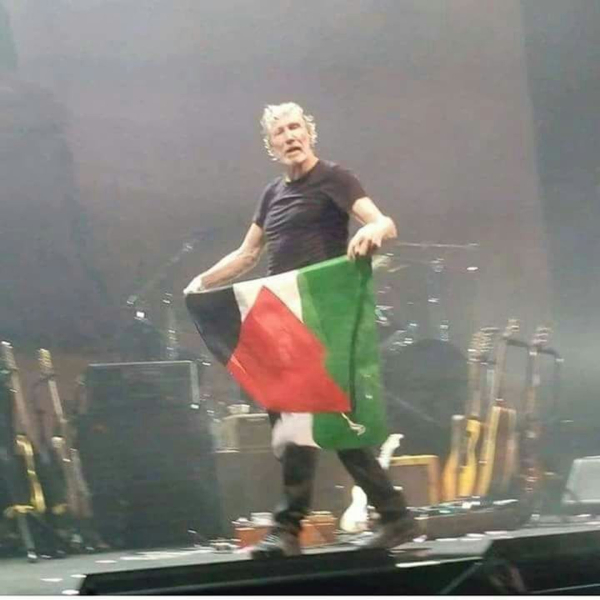
He even clashed with fellow stars, calling U2 frontman Bono “disgusting” and “an enormous s***” for honoring Israeli victims killed by Hamas militants at the Supernova music festival on Oct. 7, 2023. “Your opinion is so disgusting and so degrading… sticking up for the Zionist entity,” Waters said.
Many fans were dismayed to see a virtuoso like Eric Clapton come out in support of Waters. Clapton too has said Israel “is running the world.”
Oasis guitarist Noel Gallagher, reacting to the Glastonbury uproar, blasted the idea of politicizing rock music: “It’s getting a bit woke now, that place, and a bit kind of preachy and a bit virtue-signalling. I don’t like it in music – little f***ing idiots waving flags around and making political statements and bands taking the stage and saying, ‘Hey guys, isn’t war terrible, yeah? Let’s all boo war. F*** the Tories man,’ and all that. It’s like, look – play your f***ing tunes and get off.”
It’s hard to say what’s more telling — and what lesson the modern world should take to heart: whether it’s Waters calling opposing views “disgusting” and their holders “s***,” or Gallagher dismissing people with outspoken views as “little f***ing idiots.”
A “festival of love” no longer
Online, it’s now unthinkable to imagine someone saying: “You know, I’ve listened to you and maybe you have a point I hadn’t considered.” Maybe that used to happen. But not anymore. Echo chambers have done their work. Positions have hardened to the extreme. No argument from the other side holds weight anymore. Both sides want the same thing: suppression, banning, and cancellation of the other, who naturally hold the “wrong” opinion.
One might understand such emotional rigidity in the Middle East. It’s the brutal effect of war, where empathy for the enemy vanishes and everything turns black and white. Tragically, this is how war always works. But what’s happening in peaceful Britain? Is this war now, too?
Here’s a letter from Andrew Castle Stewart to The Telegraph: “I remember Glastonbury as a festival of love, but no longer. Its politics of the Left – which Michael Eavis tells us we must accept as festival-goers — have given rise to divisive language and created ill feeling towards other human beings, making a profit from the us-and-them mentality.”
I’d agree, but I’d also add: the right does the same. It too relies on “us vs. them,” and it too poisons the atmosphere of peace and tolerance. With some allowances, I’d venture to say that many of the same people who raged at each other over Brexit, COVID restrictions, or Boris Johnson’s antics have now found a new reason to clash. Only now, the stakes are life and death — for both Israelis and Palestinians.
The unfortunate centrists, along with the BBC, who attempt to reconcile the opposing sides, are met with contempt from both ends of the spectrum. They’re pressured, berated, told to drop the “nonsense” and pick a side. I can’t count how many times I heard this during my fifteen years at the BBC: stop sitting on the fence, open your eyes, accept the truth. And I heard it from the right and from the left, from Israelis and Arabs, all utterly certain of their truth.
The centrists, who attempt to reconcile the opposing sides, are met with contempt from both ends of the spectrum.
This mutual hatred and total intolerance of differing views, far from unique to Britain, raises uncomfortable questions. Are these the warning signs of a coming collapse of liberal democratic order? Perhaps that’s too bleak. But those are the kinds of thoughts that linger after yet another “joyful” music festival.


